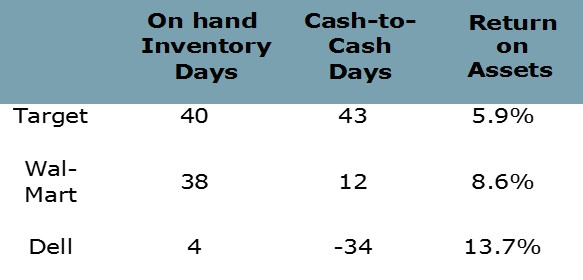Supply Chain Metrics: Just How Important Are They?
 The value of Supply Chain metrics depends on your Supply Chain objectives and how they support your business strategy.
The value of Supply Chain metrics depends on your Supply Chain objectives and how they support your business strategy.
If we define the Supply Chain as the core set of processes that link suppliers to customers via the value-adding manufacturing process, then the objectives are clear. At the highest level, the Supply Chain must contribute to increasing shareholder value by making the business more competitive and more profitable within the context of your business model. The challenge is to find the most important metrics that reflect what the supply chain must do to support those objectives.
A first step is to break down pertinent supply chain metrics into groups:
Supply Chain Performance – Demand forecast accuracy, replenishment lead time and variability, supplier performance, etc.
Customer Service – service levels, order fill rates, on-time delivery, etc.
Supply Chain Leverage – inventory cost, manufacturing cost, material cost, DSO, DPO, etc.
Each metric group has a different level of detail associated with it depending on the business function and level in the execution hierarchy where the metrics will be used.
Metrics supporting Supply Chain Performance strive to improve demand visibility through improved demand forecast accuracy (DFA). Driving continuous improvement in DFA at the lowest level in most make-to-stock companies will create enormous leverage downstream in the supply chain.
Supply chain metrics supporting Customer Service strive to balance service levels against customer profitability. While providing 99% fill rates is admirable, it may be too costly for some classes of customers and the products they buy.
Metrics supporting Supply Chain Leverage strive to reduce the cash-to-cash conversion cycle time (including days of inventory) while maintaining targeted customer service levels. In a competitive market, supply chain flexibility improvements are key and needed to support the innovation cycle of the business.
Supply chain metrics are an important tool for measuring progress against goals, and benchmarking is an excellent way to establish the goals for improvement programs. As an example, the Supply Chain Leverage of several world-class companies has set the bar quite high.
Dell, one of the most efficient supply chains in the world, with DSO less than half of DPO, is able to use their supplier’s cash to generate profit and shareholder value. Wal-Mart, while in a different industry, has much more efficient operations than their upscale competitor, Target.
Best-in-class companies have a balanced set of performance metrics that stretch from top to bottom of the business, carefully linked from level to level in successive degrees of detail. Many of these same companies have compensation and incentives tied to their performance metrics for truly driving continuous change.
As the saying goes, if you can’t measure it … you can’t manage it, and tools like Silvon Stratum establish the base for building highly customizable metrics-based business management systems.
